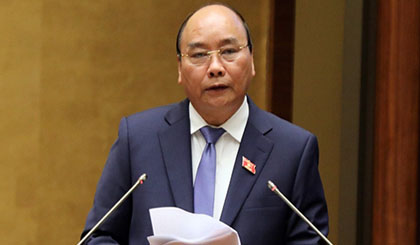PM clarifies deputies' queries at NA Q&A session
Prime Minister Nguyen Xuan Phuc reported on and explained a number of issues of the National Assembly (NA) deputies and voters’ concern, whilst answering questions raised by the deputies at the ongoing Q&A session of the 14th NA’s fourth sitting in Hanoi, on November 18.
 |
| PM Nguyen Xuan Phuc at the Q&A session on November 18. (Photo: VGP) |
Responding to the deputies’ concern over the growing wealth gap and the role of the private sector in the current climate, the PM stated that the Party and State have given top priority to improving the people’s living conditions over the past few years, with certain results having been accomplished.
In order to reduce the wealth gap, he emphasised a number of measures to focus on in the time ahead, including the continuous efforts to ensure social security and enhance the quality of education and healthcare services, especially for the poor and revolutionary contributors; to boost job creation and vocational training for labourers, particularly those in rural and mountainous areas; and to mobilise non-State funding in hunger elimination and poverty reduction.
The PM highlighted the significant role played by the private sector in the national economy, affirming that the State will work to ensure the private sector’s equal access to resources, strengthen the protection of investors, reduce costs, especially unofficial costs, and accelerate administrative procedure reforms.
Private businesses need to uphold the corporate culture and ethics for sustainable development, whilst refusing unofficial fees, as well as bribes, towards sustainable development, he said.
Replying to a question concerning the efficiency of build-operate-transfer (BOT) transport projects, PM Phuc affirmed that the development of transport infrastructure via the mobilization of non-State sources is an upright policy of the country and has brought about initial results.
Touching on the existing shortcomings, he asked the functional agencies to continue reviewing and finalising the legal system on the implementation of BOT transport projects; strengthen control over the investment level, fees and fee collection duration; and organise public and wide bidding in order to attract more resources.
Clarifying the contents of a facilitative Government, the PM stated that the focus of a facilitative Government is to act proactively in designing appropriate policies that meet the development situation of the country and the world; to build a favourable business environment for investors and businesses; and to enhance the quality of education and healthcare, with the optimal goal of better serving the people.
It is also a dynamic Government of action and close bonds with the people, he added.
Answering questions on the smart city development guidelines and the independence and autonomy of the Vietnamese economy at present, the Government leader noted that a smart city needs to ensure many different criteria, including the enhancement of management efficiency and the quality of public services, the protection of a clean living environment, and the close relationship between the government and the people.
As for the autonomy and independence of the Vietnamese economy, he hailed the two as an important issue in the current rapid and extensive integration stage, stressing the need to continue developing an appropriate, safe, sustainable and highly competitive national economic structure with balanced development between the different spheres.
During the Q&A session, PM Phuc also clarified the NA deputies’ questions in regards to useful measures to push back the “small corruptions” currently occurring in levels, sectors and fields, alongside the Government’s efforts to reform administrative procedures.
NA Chairwoman Nguyen Thi Kim Ngan concluded that the Q&A session took place in a democratic, lively and constructive fashion, with the NA deputies having demonstrated their enthusiasm and responsibility.
She emphasised that the NA recognises the seriousness and sense of responsibility of cabinet members and the chief justice of the Supreme People’s Court in answering the deputies’ questions and directing the timely handling of the existing shortcomings towards boosting production, improving the people’s lives and ensuring social equality.
(Source: NDO)
 về đầu trang
về đầu trang







